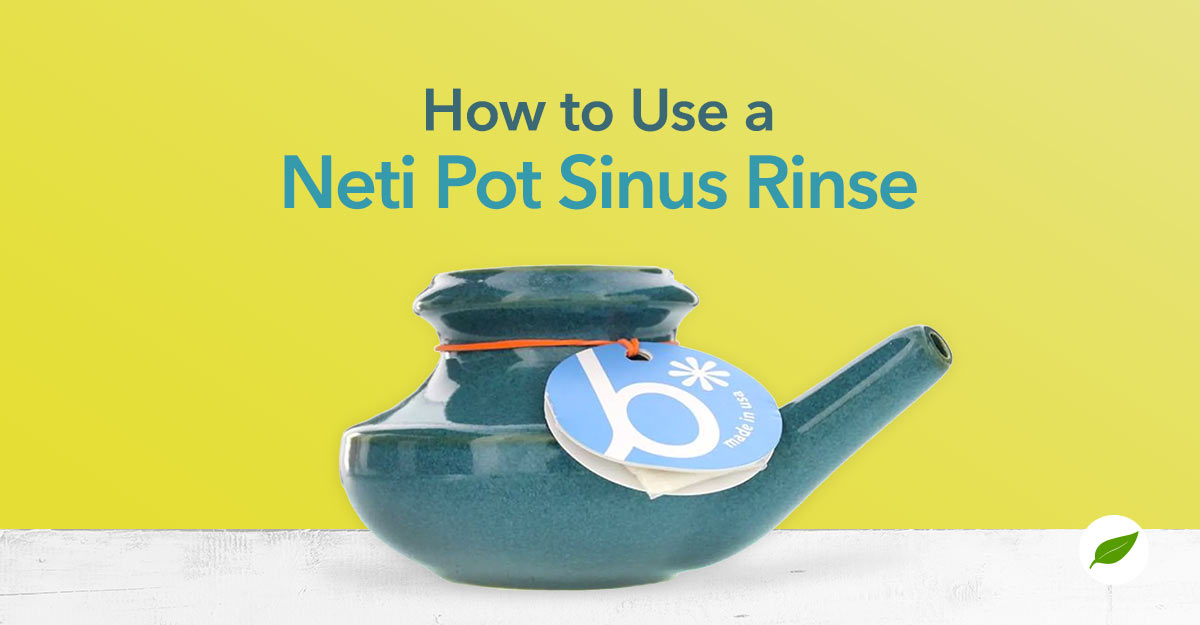
Learn which neti pot could be right for you and how to use it to help clear your sinuses.
If seasonal changes wreak havoc on your sinuses, you’re not alone. You may be tempted to reach for decongestants and pain relievers to get some relief, but how about try something that can provide immediate relief naturally… like a neti pot? If used correctly, they are totally safe and effective, and once you get used to it – very easy to use. Plus, the neti pot has been used for thousands of years as part of the Ayurvedic medical system, so it’s not like some untested fad that could have unwanted side effects.
What is a Neti Pot?
A neti pot is a nasal irrigation rinsing device – such as a bulb syringe, squeeze bottle, ceramic pot, or a battery-operated pulsed water device, according to the FDA – that uses saline or salt water to help clear out congested nasal passages, which are common during seasonal health challenges. We’re not gonna lie, it takes a minute to get used to it, but using a neti pot can seriously help you feel better right away.
Some neti pots look like little teapots, and the idea is to literally flush out your sinuses by pouring liquid into one nostril, letting it make its way through your sinus passages, and allowing the liquid to flush toxins out the other side (hopefully bringing all that nasty stuff that’s making you feel bad with it).
Potential Health Benefits of Using a Neti Pot
- May provide relief from season health challenges such as stuffy, runny nose and sneezing.
- May help with headaches caused by sinus pressure
- Helps clear nostrils for improved breathing
- Provides moisture for dry nasal passages
- May help alleviate facial pain and pressure associated with seasonal health challenges
- Helps remove bacteria, allergens and other irritants from the nasal passages
- May heighten the sense of smell and taste
- May help with snoring associated with congestion
- May eliminate the need for medications
How to Use a Neti Pot
Step 1 – Wash your hands and make sure your neti pot is clean and completely dry.
Step 2 – Using only sterilized, distilled or filtered water, follow the directions on the box to mix your saline mixture. You have options on NHC.com, but most pots come with packets of neti salt which are totally fine to use, especially if you’re a neti pot newbie!
Find some of our favorite neti pot, nasal salt rinses and similar products from Baraka and the Himalayan Institute – two trusted brands available on NHC.com that focus on Ayurvedic and holistic health.
Step 3 – Lean over a sink and tilt your head at a 45-degree angle so you forehead and chin are roughly level with each other. This is important to keep the liquid from flowing down your throat and into your mouth.
Step 4 – Open your mouth and take a couple of breaths so that you get the hang of breathing without your nose, insert the spout of the neti pot into the upper nostril and tip the pot so that the liquid flows into your nose, through your sinuses, and drains out through the lower nostril.
Step 5 – Blow your nose with a tissue to clear out any remaining mucus, then repeat the process by tilting your head the opposite way and using the neti pot on the other side.
Step 6 – Completely clean and dry your neti pot to avoid any bacteria growth. Use it as often as needed.
Like we mentioned, it can take a hot minute to get used to pouring liquid into your nose (that’s something we usually try to avoid), but a neti pot can really help you feel better, fast. In between uses, you can also try saline mists or nose oils to keep your nasal passages hydrated.
Do you use a neti pot? Tell us what you love most about this ancient Ayurvedic therapy in the comments below!
